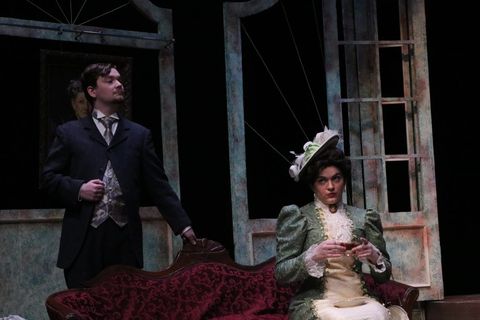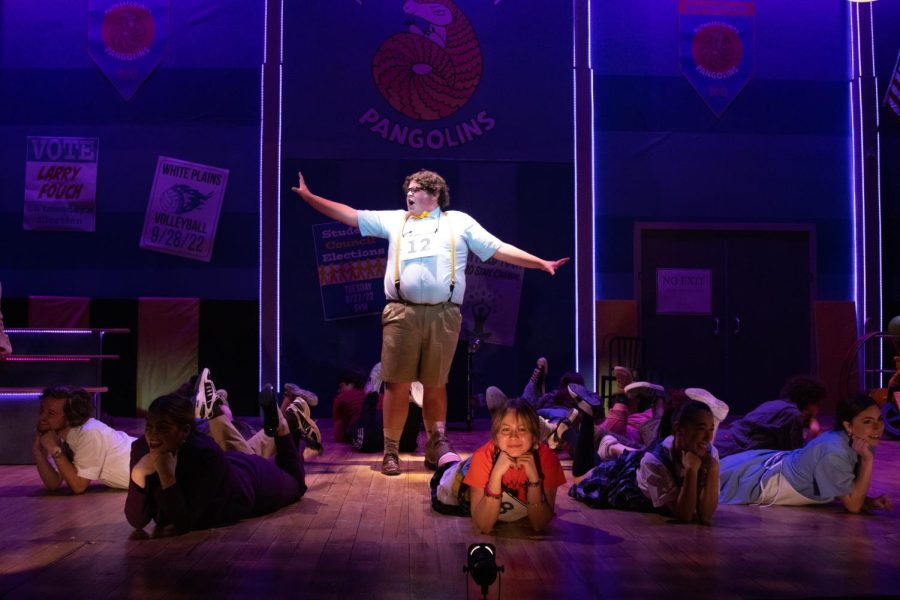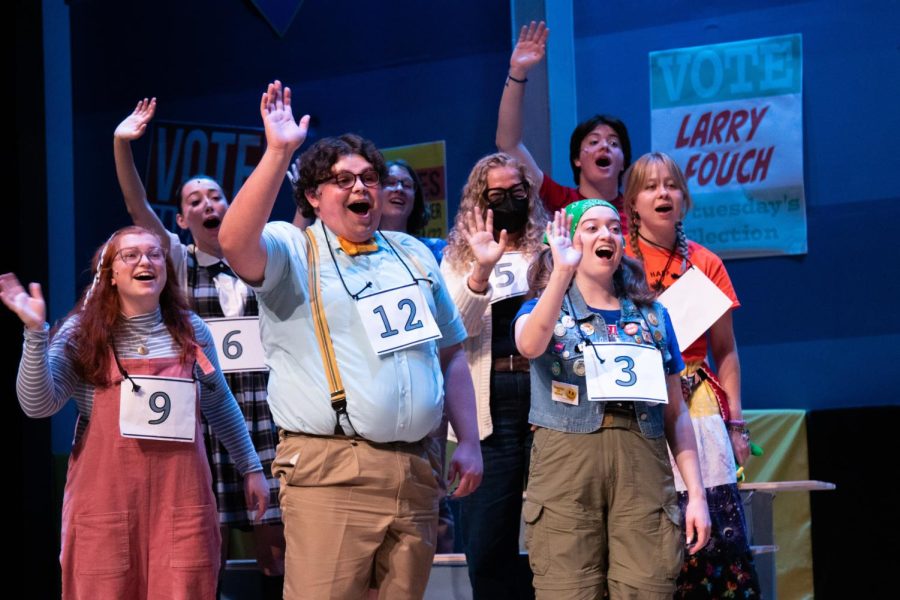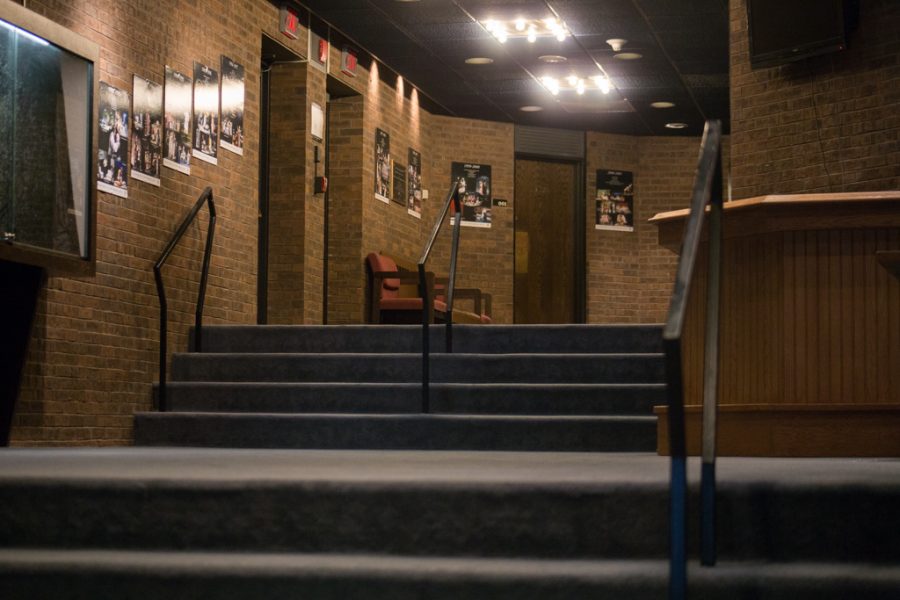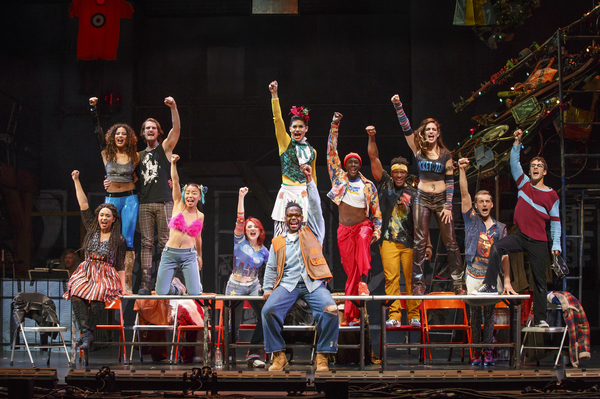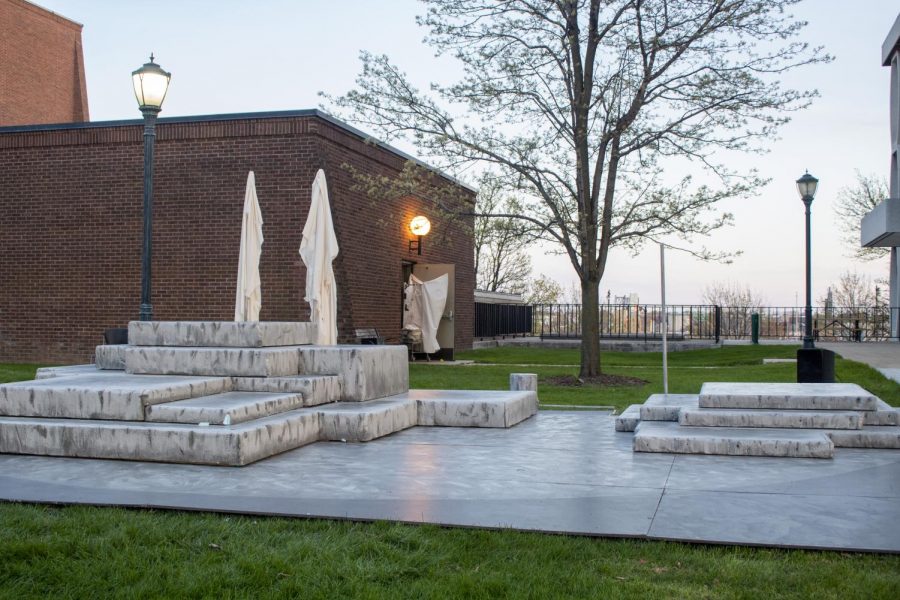
Yes, “Urinetown” is about pee. And yes, it’s also a sharp political satire on revolution, inequality and sustainability. But wait, there’s more. It’s also a musical.
Marquette Theatre’s upcoming production of the cult-classic show opens tonight at 7:30 p.m. in the Helfaer Theater. “Urinetown” is Marquette’s largest production in recent years, with a 20-person cast and an elaborate multi-level set design.
Since its Broadway debut in 2001, the show has gone on to win three Tony Awards and earn devoted fans who love its original mix of self-referential humor, big choreographed dance numbers and deep strain of irony.
“I think it’s funny because you can tell who the people are who really know musicals,” said Armando Ronconi, who plays one of the show’s primary villains. “Some people ask, ‘Oh, is it ‘You’re in town?’ Is it like ‘Oklahoma?’ No, it’s not at all.”
Far from the earnest and sunshiney “Oklahoma,” “Urinetown is set in a world of extreme drought where everyone must pay to pee.
The show features a large cast of motley characters. There is the delighted-to-be-evil oligarch Cladwell B. Caldwell, played by Ronconi, a junior in the College of Communication. Caldwell heads the oppressive corporation UGC (the Urine Good Company), which plans a pee fee hike at the beginning of the show to fund a company vacation to Rio.
The show’s narrator and enforcer of the pay-to-pee laws comes in the hilarious yet corrupt form of Officer Lockstock, played by Chris O’Reilly, a junior in the College of Arts & Sciences.
Lockstock oversees struggling citizens who face banishment if caught letting their bladders get the best of them.
Among the poor citizens are Little Sally, a play off the classic kid-in-a-musical role with uncanny insight (Kelly Dillon, a junior in the College of Education); Bobby Strong, the show’s romantic lead with idealistic notions of love and revolution (Peter Sisto, a sophomore in the College of Arts & Sciences); and the street-smart and tough-talking Penelope Pennywise (Lexi Hamburg, a junior in the College of Communication).
The street urchins are soon joined by the show’s romantic lead Hope Cladwell, a privileged girl conflicted by loyalties to her father (Kaitlyn Barrett, a senior in the College of Health Sciences making her Marquette Theater debut).
In a way, “Urinetown” calls to mind the plot of “The Producers” in that the characters come close to making a show so ridiculous and offensive it’s sure to flop and instead create a smash hit and brilliant satire. But “Urinetown’s” writers are more evolved than the fictional Bialystock and Bloom.
Whereas “The Producers’” duo used shock in the hopes of failing, Urinetown creators Mark Hollman and Greg Kotis wrote a punchy and irreverent musical that is fully aware that the lewd can be made smart, satirical and subversive.
“Urinetown” is thick with references to other classic musicals, with song and dance numbers in the style of “West Side Story” and “The Music Man,” among others.
“The music speaks to me. It’s so heartfelt, and it harkens back to so many different musicals that we know and love,” “Urinetown” director Tony Clements said. “But it does it in such a smart, creative way that it isn’t always ‘wink, wink,’ even though that’s part of it, and it’s also not over the top, even though that’s part of the fun, too. It’s done so intelligently that you could watch this show and not know any of those musicals and it wouldn’t matter.”
In addition to direct allusions, many of “Urinetown’s” references are thematic or subtle. The show’s self-effacing role as a political musical recalls messages of Bertolt Brecht’s serious political dramas or, in the most direct jabs, “Les Misérables.”
“It’s not written in the script where it says ‘Les Mis reference here,’ so bringing that out was really left up to the creativity of the cast and crew,” Barrett said. “In some scenes we might not have even known we were referencing something, but people in the audience would pick up on it. Like there’s a scene where Kelly, who plays Little Sally, gets put up on someone’s shoulders. We realized it was just like Gavroche in Les Mis, which was a great discovery in a place where our director really trusted us.”
The references to the history of musical theater don’t stop in the script, music and choreography but continue to the show’s larger aesthetic.
“Our set hearkens to another musical from not too long ago and one from the ‘70s,” Clements said. “There’s something very ‘Rent’ about our set and also something very ‘Godspell.’”
The set, which features a working garage door, moving staircases and a stage full of artistically graffitied walls, sets this production of “Urinetown” apart from the traditional look of the show.
“Some of the things our set does are very different,” Clements said. “There might be a tendency to make ‘Urinetown’ very Dustbowl-y, to make this world very 1930s. Our world has some of that, as you’ll see in the costumes, but our set is also really contemporary.”
Lex Gernon, a senior in the College of Communication, is the set designer for the show. Gernon began designing for the show last September and has spent hours constructing “Urinetown’s” atmosphere.
“The look is of the modern city, because I think this is a play about today and what’s happening to us,” Gernon said. “It’s based a lot on Madrid, because I think it’s an old city that has evolved into a modern city.”
The 20 cast members of “Urinetown” have also made big commitments to make the show a success.
“It’s so wonderful to see a group of people who embrace each other, who have such passion, such dedication and such commitment and work their butts off,” said Clements, a veteran of both Milwaukee and national theater. “It’s an amazing thing. I don’t have a degree, but I think if I had gone to school I would have gone to Marquette. I feel like I get an education every time I come here to direct. I learn so much from (the cast). They’re going to school, they have jobs, they have family stuff and they’re (in the theatre) for five to six hours a night. It’s remarkable. I don’t do this for any other reason than that I learn so much every time.”
The cast has worked to deliver the fun and comedy that make “Urinetown” such a popular show. But beyond the bathroom humor, musical theater tropes and ensemble dances, “Urinetown” also holds a political message.
In a switch in tone representative of the many surprising twists and turns “Urinetown” takes, characters reference a key figure to the show’s the message, the late 18th century economist Thomas Robert Malthus. It may seem odd at first that the writers included a nod to this intellectual, who theorized that calamity was crucial to keep the world’s population environmentally sustainable, but the moment is important in understanding the larger message of “Urinetown.”
“The line ‘hail Malthus’ holds the biggest irony of the play,” O’Reilly said. “All the characters are shouting for sustainability, but you see what’s become of them. It’s all drought, and it’s all gone now.”
With this socially conscious strand, “Urinetown” packs a political punch. But along with a somewhat harsh political statement, it delivers enough humor, singing and, of course, jazz hands to soften the blow.


